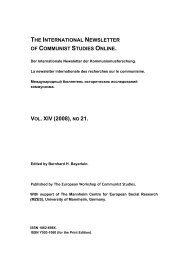11RXNdQ
11RXNdQ
11RXNdQ
Create successful ePaper yourself
Turn your PDF publications into a flip-book with our unique Google optimized e-Paper software.
The writings collected in this volume illustrate Sartre’s developing response to<br />
colonialism: moving from the ethical to the political, from a preoccupation with<br />
individual freedom to intellectual and political commitment, and the moral demand for an<br />
assumption of responsibility for each individual’s role in history. The essays demonstrate<br />
successively how he reformulated and sharpened the politics of negritude in Senghor,<br />
sketched out the limitations of colonial discourse and stereotypes vis-à-vis China,<br />
articulated the psychology of colonialism in Memmi (itself a nuanced response to his<br />
own Manichaean account of the colonial divide, subsequently developed by Fanon),<br />
articulated the power dynamics of neo- and postcolonialism in his analysis of the political<br />
role of Patrice Lumumba, and brutally confronted the French reading public with Fanon’s<br />
revolutionary discourse of liberation by emphasizing the epistemological revolution that<br />
was taking place at the same time.<br />
These essays therefore bring out a number of important factors both for Sartre himself<br />
and for postcolonial critique, beginning with the political background to Fanon and other<br />
activist anti-colonial writers, particularly with respect to the war in Algeria (Sartre’s<br />
newspaper articles here should be read alongside those of Fanon in the FLN newspaper,<br />
El Moudjahid, collected in Toward the African Revolution (1964)). The essays also<br />
provide evidence of Sartre’s political commitment as an intellectual, his radical placing<br />
of anticolonial struggle at the centre of the political agenda as a part of his commitment<br />
as a Marxist (particularly evident here in his analysis of the basis of colonialism in<br />
Algeria). Sartre foregrounds the way in which Marxism is a flexible body of ideas that<br />
requires theoretical elaboration and adaptation to specific circumstances, as well as<br />
renewal and theoretical input from new contexts and locations. Finally, these essays<br />
demonstrate Sartre’s early recognition that the anti-colonial movements were not<br />
narrowly political campaigns but developed their own cultural and political positions<br />
through the elaboration of a revolutionary ‘tricontinental’ epistemology. 1<br />
II<br />
At a theoretical level, Sartre’s influence on black Francophone intellectuals was in certain<br />
respects greatest from the period before his political radicalization. The development of<br />
what Merleau-Ponty<br />
1 I use the term ‘tricontinental’ here, in preference to the term ‘Third World’, with reference to the<br />
articulation of the anti-colonial and anti-imperial movements at the first Conference of the<br />
Organization of Solidarity of the Peoples of Africa, Asia and Latin America at Havana in 1966,<br />
known popularly as the ‘Tricontinental’. The Tricontinental marked the initiation of a global<br />
alliance of those from the three continents of Africa, Asia and Latin America against imperialism,<br />
signalling a common commitment to social and political transformation. Postcolonialism, I<br />
suggest, as a body of tricontinental counter-knowledge positioned against Eurocentric discourses,<br />
would also better be called ‘Tricontinentalism’ (Young 2001).<br />
called Sartre’s ‘ultra-Bolshevism’ occurred relatively late in his career, and there is<br />
comparatively little in the early work, focused on the necessity of freedom, to suggest his<br />
later increasing preoccupation with social injustice at a global level. In Being and




